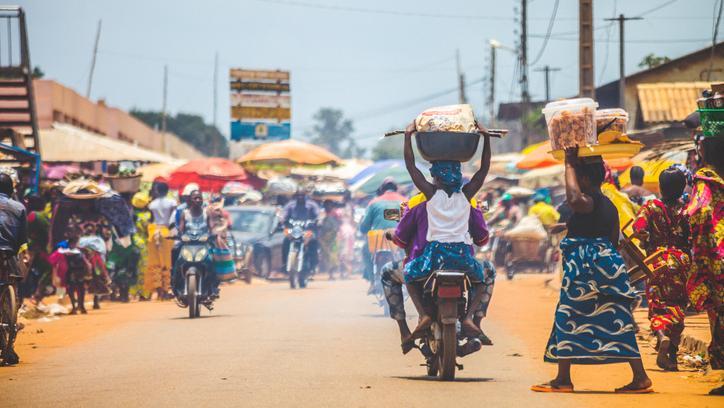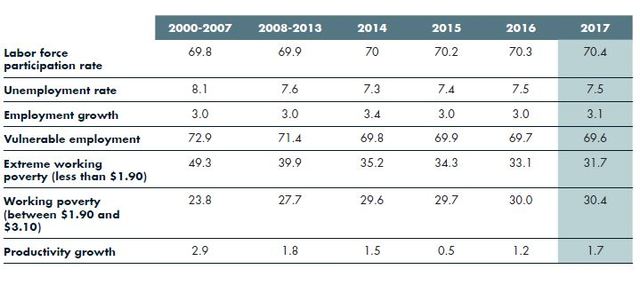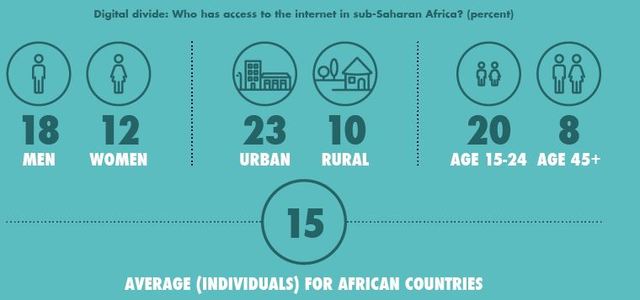
American research group The Brookings Institution has just published its annual Foresight Africa project. Foresight Africa is a series of reports, commentaries and events aimed at helping policymakers and speculators stay ahead of developments impacting the continent.
Brookings Africa Growth Initiative scholars and outside experts explored six themes that provide opportunities for Africa to overcome challenges and promote growth. We summarise them here:
Mobilising financial resources
How can Africa manage the commodity slump and attract investment?
- By early 2016, oil exporters’ current account surpluses had breached a 10-year low.
- The price of the commodity fell from $112 per barrel in mid-2014 to less than $39 in early January 2016. In 2017, policymakers will continue to face gloomy prospects.
- Ghana’s growth rate is projected to rise substantially in 2017 following the opening of a new oil field. This may increase the country’s output by almost 50 percent.
- Côte d’Ivoire, Ethiopia, Senegal, and Tanzania are expected to remain within the top five African countries with the highest growth rates in 2016 and 2017, based on current estimates.
- Many social challenges that were once exclusively the domain of government budgets and aid groups can today be tackled with help from business
- Enhancing agricultural productivity is not an outdated concept. Higher productivity would raise the income of farmers and free up resources for other economic sectors.
- Fiscally vulnerable commodity-rich countries could reduce fiscal deficit by reducing government spending and increasing efficiency in 2017. They could also increase tax rates.
- Countries like Nigeria and Angola could quickly mobilise revenues from non-commodity-related activities by increasing their VAT rates with relatively small side effects on economic activity.
- Event to watch: The African Development Bank Group’s 2017 annual meetings – May 22-26, 2017
Increasing employment opportunities
How can Africa grow and stabilise its job market?
- Sub-Saharan Africa faces a rise in the share of its working-age population (WAP). Population data indicates that the WAP in the sub-Saharan African region will increase by 70 percent from 466 million in 2013 to 793 million in 2030 (Lam and Leibbrandt, 2013).
- Farming is the dominant occupation of most young Africans. The agriculture that will allow young farmers to prosper will have to draw on quality modern agricultural science – at present it does not.
- Lack of access to finance for youth and particularly women entrepreneurs further limits growth and expansion opportunities.
- A broader vision of high-quality education (one that fosters the full breadth of skills needed in a changing world) should be a priority in 2017.
- Broadening access to education will ensure a steady supply of skilled workers into the labour market to support the transition to higher value added sectors.
- it is important to diversify economic activity away from the current high concentration in traditional low value added agriculture, as it is in many African economies, to more productive activities such as agri-processing, manufacturing, and high-value added services.
- For those young self-employed workers in the informal sector, there should be institutional mechanisms that ensure adequate access to credit, in light of the fact that these individuals are likely to be wealth and asset constrained.
- Event to watch: African Union Assembly Meeting – January 24-31, 2017
Boosting transformational technology
How can Africa create supportive environments for important innovations?
- Internet prices in sub-Saharan Africa vary wildly. Geography affects prices – landlocked countries pay more than coastal countries. Much of Africa gets its internet via undersea cables, so coastal countries have easier access. New initiatives to provide internet via low-orbit satellites and high-altitude balloons offer the hope of more accessible, cheaper internet for all, though still have a long way to go when it comes to cost and reach.
- Tech hubs are popping up in Africa in different forms. These hubs enable Africans to gain skills and network through brainstorming sessions, workshops, and business- and technology-related trainings, among others. South Africa, Kenya and Ghana boast the greatest number of tech hubs.
- For further progress and increased uptake of transformative innovations in 2017 what is required is further improvement in the regulatory environment.
- Rules and guidelines should encourage prudent behaviour by both the financial institutions and market participants. Regulators should manage the orderly entry and exit of financial institutions in the market, minimising the potential for major disruptions in the financial system.
- Digital finance has the potential to provide access to financial services for 1.6 billion people – more than half of whom are women – in emerging and developing economies.
- Event to watch: United Nations World Data Forum, January 15-17, 2017
Bolstering urbanisation efforts
What’s Africa’s approach to the New Urban Agenda?
- In 2016, Africa was the only region to provide a coordinated response to what should go into the United Nations’ New Urban Agenda. The action-oriented document set global standards of achievement in sustainable urban development.
- Regional leaders must resist parochialism— understanding that collaboration with neighbours is imperative at a time when competition is global, not local.
- Once proven in one region, innovations in governance and policy must be spread—adapted and tailored for other areas and other cities.
- Sanitation delivery in Africa continues to be a problem, though urban areas offer much more access to vital services such as water, sanitation and electricity.
- Without a clear vision for how to grow cities to accommodate half a billion people over the next 20 years, Africa’s cities will continue to sprawl.
- Africa’s urban future will benefit from better planning, but the risk is that the pendulum swings too far and that cities are over-determined, unable to adapt to change, and lacking in creativity.
- Many experts—pointing to examples like the Chinese-built city of Kilamba outside Luanda—believe Africa’s cities will be built by foreign interests. The lack of skills, institutional capacity, and finances present a significant challenge to Africa’s urban agenda.
- Successfully managing Africa’s urbanisation involves finding the balance between getting the basics right in megacities and promoting population and industrial de-concentration into secondary cities.
Confronting climate change
How can Africa tackle this increasingly urgent issue?
- In a sample of 30 African countries, two-thirds are warming faster than the world as a whole—a trend expected to continue in coming decades.
- The rapid growth of African urban centres like Nairobi, Lagos, or Abidjan opens an opportunity for the development of distributed solar generation, thereby accelerating access to clean electricity as experienced by Mexico and other large cities in Latin America.
- Sub-Saharan Africa is predicted to bear the brunt of climate change going forward. Not only will this phenomenon create droughts, floods, famines, and other disasters, unsurprisingly, is it also predicted to greatly and negatively impact the region’s economic growth.
- To implement sustainable development in 2017, African economies need to transform agriculture and land use, diversify into manufacturing and other high productivity sectors, manage urbanisation and foster a modern energy transition.
- So far, $100 billion dollars per year by 2020 have been pledged to developing countries to support action. Much will be channelled through vehicles such as the Green Climate Fund and the African Development Bank.
- Event to watch: 2017 Global Platform for Disaster Risk Resolution – May 22-26 2017




One Response
I kind of love this article. The one that caught my attention is the one of employment, there are lots of graduates out there who can’t even boast of 2square meal per day. All we need is a leader who is sacrificial not some kind of self centred leaders.